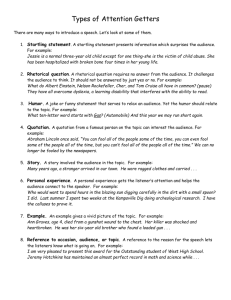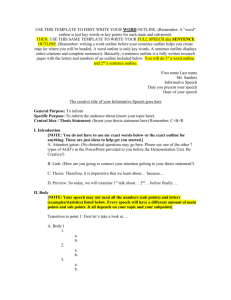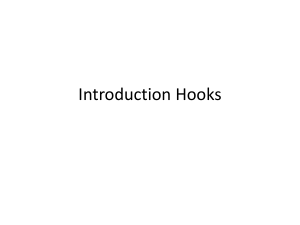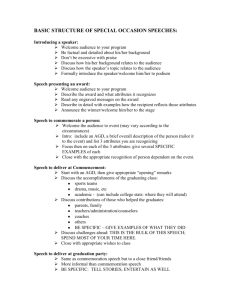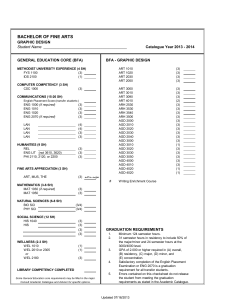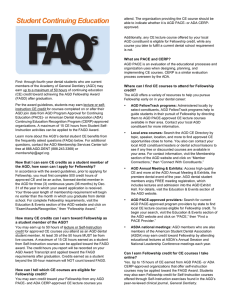Speech 205 - Introductions and Conclusions PPT
advertisement
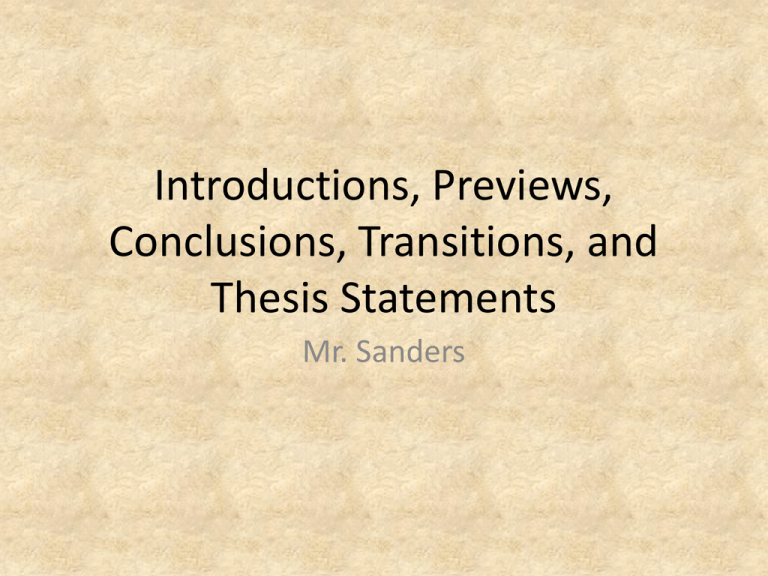
Introductions, Previews, Conclusions, Transitions, and Thesis Statements Mr. Sanders 09/26/13 • We have 4 straight days of PPT notes in here, then we are pretty much done for the semester. Really! • 2 days of attention getters, transitions, and conclusions to strengthen the outline (the skeleton) • 2 days of literary elements to strengthen the body (meat) • Before we start, did anyone analyze their friends/family in terms of communication styles? • Circles? • Squares? • Triangles? • Rhombus? – What category did your friends/family fall under? Is this the same category as you? Seriously? Who cares? • Purpose: The effect of a speech depends heavily on how you greet the audience, how you leave the audience, and how your speech hangs together. Therefore you must put time and effort into introductions, conclusions, and transitions. • Note: You can not get an A, B, or C on the 3 biggest grades in here or pass the Final Exam if you do not pay attention today! I expect you to know this information VERY well. We will use this information EVERY DAY! Big Idea #1: Why we have “Introductions” • Introduction has three purposes… – Gain Attention – Convince your audience that you are going to be good at this! – Present your topic and purpose – You should preview your main points by the end of your Intro – Connect with your audience – You must come across as interested in your topic and your listeners POV 8 Types of Introductions (1-4) • Startling Statement – “Jesse is a normal threeyear-old child except for one thing: she is the victim of child abuse.” • Rhetorical Question – “What do Albert Einstein, Cher, and Tom Cruise have in common? They have all overcome dyslexia.” • Humor – “What ten letter word starts with G-A-S? It’s automobile and this year we may run short again.” • Quotation – Put a quotation at the beginning and end that relate to your theme. Write your own AGD: Topic = Economy, Star Wars, or Pets • Startling statement – The US is $_______ in debt. That means that…. • Rhetorical question • Humor • Quotation • Write 5 AGD’s using one of each type, NERDS! – Topic ideas: Music, Current events, Football, or Robots • • • • • Startling statement Rhetorical question Humor Quotation Personal Experience Introductions (5-8) (5-7 =similar) • 5-Story – “Many years ago, a stranger arrived in our town. He wore ragged clothes and carried a walking stick. It turns out this homeless man was my father!” • 6-Personal Experience – “Who would want to spend hours in the blazing sun digging carefully in the dirt with a small spoon? I did.” • 7-Example – “Anne Graves, age four, died from a gunshot wound to the chest. Her killer was shocked and heartbroken. He was her six-year-old brother, who had found a loaded gun.” • Reference to occasion – “Thank you for having me here. I am very pleased to present this award to…” Bell Ringer • Looking at your previous examples of AGD’s – Write down one original example of each one you missed. If you don’t know how to do these, you most likely will not do well on your next 50 point assignment. AGD 5-8 practice Topic: _______ • Story – • Personal Experience – • Example – • Reference to occasion - Using one of the 8 AGD’s you just learned, Re-write this Introduction, playas! • “I’m going to talk to you today about something I find interesting. I’ve been interested in this for a long time. Most of you should find it interesting, too. You may have seen dolphins at the zoo. My topic today will be on communication with dolphins.” – THIS IS NOT A GOOD EXAMPLE. FIX THIS. • Write your own example. • Share examples with people around you, then with the class. Big Idea #2: Why we have “Conclusions” 3 purposes • Summarize your main points • Repeat your main goal • Provide a clear ending – Don’t leave the listeners wondering whether the speech is over. Give a final decisive statement. 3 types of Conclusions – Summary/Review Statement – THIS MUST HAPPEN AS THE FIRST SENTENCE OF EVERY CONCLUSION. “So today we examined 1st, 2nd, 3rd…” • Quotation – Just like my mom always said, “Life is like a box of chocolates, you never know what you’re going to get.” • Appeal / Challenge – Asking or motivating the audience to do something – “Please remember that seat belts save lives and prevent serious injury. Buckle up!” • Story – Connecting your AGD story to your Big Idea #3: Preview/Review Statement • Preview Statement: comes directly after your thesis statement. • “So today we will examine 1st…., 2nd….. And finally…. • Review Statement: comes directly after the last line in your final body paragraph. • “So today we examined 1st…,2nd…and finally…” • I expect you to know and apply this on every speech from here on out. PRACTICE IT!!! – Why are these poor examples? • “So today we looked at Dolphins. Okay, I’m done.” • “As we learned today, Dolphin communication is awesome communication. And that’s my speech.” – Write your own conclusion to your dolphin AGD (Attention Getting Device) from earlier, but make them better than these two. Big Idea #4: Thesis Statements (C+B+R) • A sentence or two that describes the main idea of your speech and main argument that you are trying to make. • Claim + Because + Reason = Good Thesis Statement • Claim = “Sexist language in textbooks is harmful.” • Insert the word “BECAUSE” • Reason = “it reinforces negative stereotypes about many groups and individuals.” Thesis practice • Write 3 thesis statements choosing from 6 of these topics. • • • • • • Space Travel Today’s fashion Adoption Missing children Teenage life Sports in school Big Idea #5: Transitions • • • • • • • Meanwhile, First, Second, Also, Next, As a result, In addition to, Transitions • • • • • • • Moving to, For example, On the contrary, To sum up, Another point, On the other hand, Conversely, Transitions • • • • • • In contrast, In conclusion, In the second place, Furthermore, Finally, Therefore,
